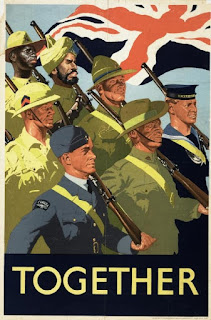Is Europe Redeemable?
This poster depicts two
British soldiers in blue uniforms leading men hailing from the different
territories of the British Empire into battle. This poster depicts unity within
these people and an implicit willingness to follow the British. Despite this
emphasis on unity and fighting together, it is telling of the internal logic of
the British Empire that the man from India and Africa – both dark skinned – are
placed, even in this poster, at the very back. Even more striking perhaps is
the fact that this British poster sees its empire as a valuable resource for
fighting the wars that Britain fights. Wars that are only the concern of the
people from the territories because said wars are the concern of Britain. They
all march under the Union Jack, because through domination the British have
compelled them to do so. It has compelled, and condemned them to fight, kill
and die.
“Europe is indefensible”,
Cesaire writes. He strips the contact between the colonizer and the colonizes
of all its trappings of civilization and development and describes it to be devoid
of “human contact” and to consist solely of relations of domination and
submission. He describes this contact as one which turns the indigenous man
into a mere “instrument of production”. A resource. This is the nature of the
gaze with which the colonizer views the colonized. The colonized were forced to
carry out this role due to the brutalizing actions of the colonizers. Cesaire recounts
statements glorifying and calling for violence and the most abject, unthinking
cruelty issued by the colonizers with respect the indigenous populations. Europe
is indefensible, in part, because it refuses to acknowledge this and sticks to
its hypocritical claim that colonialism was a civilizing mission. It is
indefensible because it refuses to acknowledge the overwhelmingly important
role that the resources of the colonized people served as justification for the
colonizers to brutalize and dominate them. Cesaire writes how the colonial
powers saw it as absurd that valuable resources “lie forever idle in the hands
of incompetents” and that they saw themselves as being tasked with the utilization
of these resources lest they go forever unused due to “the incompetence,
negligence, and laziness of the uncivilized peoples”. The colonized people were
either an instrument to extract those resources or an obstacle hindering the
extraction of said resources which were, according to colonial logic, destined
to be used ‘properly’ by the European powers.
Perhaps Europe could be
defended if this underlying logic and framework changed. However, even now, it
has not. One of the most talked about mechanisms for the United Kingdom to stabilize
its economy after Brexit is the Commonwealth. In a recent BBC article, the Secretary-General
of the Commonwealth, and one of the leading contenders for the most British
sounding name, Baroness Patricia Scotland, discusses how the commonwealth is an
incredible resource for the United Kingdom and how the United Kingdom’s
historic ties – that of Empire – have been underutilized and that more trade
was, and is, possible. She then goes on to say how increasing trade between of
the countries of the Commonwealth and the United Kingdom is easy because “these countries speak the same language”.
This is remarkably telling of how the foundational logic of resource extraction
for the benefit of the colonizers has still remained essentially the same. It
is the United Kingdom who faces economic hardship because of its own decision
and it is the Commonwealth that it immediately looks to for support. Support which
it disguises as furthering common good but one which it ultimately needs, only
for itself. Nothing has essentially
changed. Cesaires equation of “colonization = "thingification” still
holds true. They are not redeemable, in part, because the gaze with which they
view the once colonized world is still the same.
This call for Commonwealth unity and economic
cooperation is no different than the poster above.

Comments